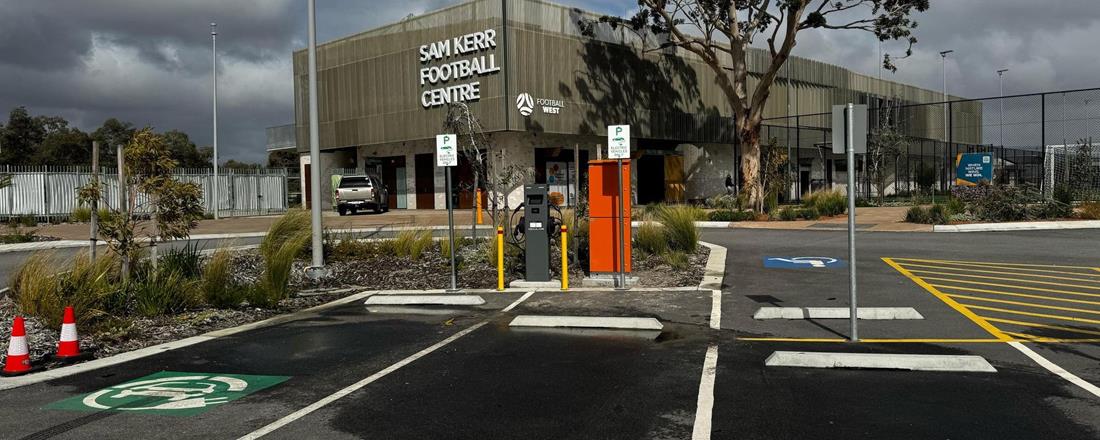EV Charging Infrastructure in Perth: Are We Keeping up with Demand?

With the increase of new EVs entering the Australian market particularly from new, up and coming Chinese brands offering more affordable prices, EV charging infrastructure has become more important than ever. Ensuring there are enough public charging stations for all who wish to charge outside their home is essential. Therefore, EVSE offers an EV charging solution to help with this issue.
In this blog we will dive further into EV charging infrastructure in Western Australia (WA) and compare it to New South Wales (NSW). We will look into the difference in volume of DC charging stations publicly available in each state and the population size in comparison, while examining deeper the challenges and solutions.
Overview of DC Charging Infrastructure in WA and NSW
Western Australia is more than three times the size of New South Wales, covering 2.646 million square kilometres compared to NSW’s 801,150 square kilometres. Although by land size WA is much bigger, it has only a total population of around 2.9 million (1.14 persons per square km) while NSW has a much larger population of over 8.5 million (10.41 persons per square km).
According to the Australian Automobile Association, NSW has been ahead of WA in battery electric vehicle (BEV) sales with a whopping 28,050 sales in comparison to WA’s 9,571, in the last four rolling quarters of 2024. This highlights WA’s slow progression in the EV industry, in comparison to other states around it.
The Infrastructure Gap: WA vs NSW
As WA is so big, DC fast charging is increasingly important to ensure residents and travelers can get from one town to another safely and reliably in their electric vehicle. Currently there are 107 DC fast and ultra fast chargers combined situated in WA, which equates to at an average one DC charger per 24,700km2. This lack of infrastructure enhances the range anxiety of many EV drivers and discourages the use of electric vehicles on long journeys and road trips.
In comparison NSW has approximately 294 DC fast and ultra fast chargers combined – which is significantly more than WA with a much smaller geographical area. This enhances the EV ownership experience as NSW drivers have the option to take larger road trips without the concern of running out of charge on the way.
Challenges to Expanding WA’s Public DC Charger Network
As previously discussed, range anxiety is a significant concern for EV drivers planning road trips in WA. This raises the question of where EV charging stations should be installed across the state. Given that much of WA’s population resides in Perth, it makes sense to prioritise infrastructure development in and around the city. However, this approach risks disadvantaging smaller communities in regional and remote areas, where populations are more widely dispersed. Without adequate charging infrastructure in these areas, residents may be discouraged from purchasing EVs, limiting adoption and accessibility in rural regions.
The Western Australia Government has implemented strategies to help alleviate the cost of infrastructure, such as subsidies, grants and rebates. One such initiative is the WA EV Network which will expand the EV charging network in Western Australia with a 23-million-dollar funding. This initiative aims to add 110 EV charging points installed across 49 locations, from Mundrabilla near the South Australian boarder all the way to Kununurra in the far north of Western Australia.
In comparison the NSW Government have allocated 149 million dollars to building a network of ultra-fast charging stations across NSW. The program will add approximately 280 fast and ultra-fast charging stations, with a DC charger every 5km in metro areas and 100km across NSW highways.
This difference in funding highlights the differing priorities between the two states and gives a potential explanation as to why WA lags behind in the number of installed EV chargers.
Why Expanding DC Charging is Critical for WA
The expansion of EV charging infrastructure across WA will influence the adoption of electric vehicles and offer significant benefits to urban and regional drivers. Economically, it reduces the cost for EV owners as electricity is often cheaper than petrol fuel, plus it will also give them the opportunity to charge publicily during non-peak times when tariffs may be cheaper. Expanding the EV charging network in WA will boost regional economies through increased tourism and spending while also increasing job opportunities in infrastructure development. Environmentally, it lowers emissions, improved air quality in urban areas and supports sustainable long-distance travel. Socially, this expansion reducing range anxiety while enhancing mobility for regional communities.
Recommendations for Accelerating WA’s Charging Infrastructure
A major contributor to accelerating WA’s charging infrastructure would be an increase in funding for infrastructure across the state. By increasing this funding, the government can focus on strategic regional locations such as the Ringaloo Reef situated 12 hours away from Perth, that will bring in tourism traffic and further bring money back into the state.
As discussed throughout this blog there is a significant gap between charging infrastructure in WA in comparison to NSW. This is further affecting EV adoption and limiting the distance that WA residents can travel with an EV. Our local WA team is currently working with local businesses, councils and governments to provide any support in the journey to electrification.
Have further questions? Contact us:
[email protected]
1300 406 210


